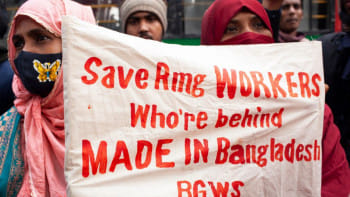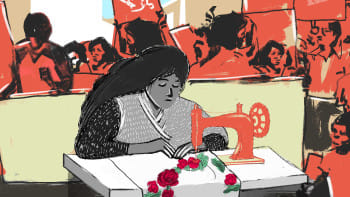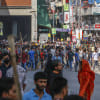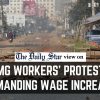The RMG workers’ movement requires stronger demands

The current workers' protests are demanding very basic things. There is nothing revolutionary or new about them that needs attention for the most part. Some of these demands include our wages being paid properly and on time, enforcing managerial changes due to abusive behaviour, stopping suspensions, and implementation of a production bonus. Additionally, female workers, especially during the later phases of pregnancy, shouldn't be made to do physically heavy work. The practice of deducting wages for being late for three days must be stopped as well. There are also demands for the attendance bonus to be increased to Tk 1,000 from Tk 500. Among the many demands we have seen, one common one is that the mandatory 5 percent salary increase should be raised to 10 percent or more.
However, some demands that should be included are missing. For example, the minimum salary declared last November should be re-evaluated. We didn't see labourers demanding the lift of restrictions on trade unions or the cessation of harassment. This is because the scale of disregard for the law is so high that the labourers are thinking if some minimum demands are met, things will get better. They will then consider their factory to be running well and go back to work.
As an activist, what I feel is that the insurmountable exploitation that the labourers have tolerated for the last 16 years or even more required much stronger demands if it were an organised movement. But the movement now is spontaneous, and it is unclear where it is beginning and where it is ending.
Regarding the issue of men not being employed in garment factories, this is a new demand and by itself, it is not surprising. However, what is surprising is the demand for equal rights for men and women. I see this as both positive and negative. The positive is that the men are not only talking about their own rights but are also demanding women's rights alongside theirs. The negative is that in the labour market, women are lagging quite far behind. If we say that 50 percent of men must be employed in the garment sector as well, then where will women labourers go? This demand is by male labourers who don't have jobs and are on the streets.
Something worth mentioning is that those who were connected with the previous government and involved in the business of collecting leftover fabric and other materials at a low price from the factories are now being replaced. The trade-off was that for the discounted price on these materials, they would "tackle" the labourers of the factories—essentially acting as goons. This is a multi-crore taka business, which is now being taken over by the BNP overnight. We are seeing this in a lot of the industrial belts. In the protests, they are using the labourers for their own benefit.
Another aspect that is problematic for the labourers is that while they were oppressed primarily by the factory owners, the unions they used to go to for resolving their issues were also run and controlled by the owners. If workers got laid off, the compensation they should receive was determined at BGMEA by some so-called labour leaders who were actually working for the owners. In cases of terminations, they would use Article 20 and give a low amount in compensation just to be able to say they gave it.
This needs to change. Why would an organisation like BGMEA, which is run by the owners, be given the power of arbitration, making the labour court and Department of Inspection for Factories and Establishments (DIFE) ineffective? If these two organisations can be empowered, then the grievances of the labourers would have a formal place to go. Additionally, the labourers will also be able to build faith in the legal system and have respect for it.
When do labourers or people go to the streets to protest? When they don't have a place to voice their concerns. The trade unions were supposed to be the channel for the workers. But these very trade unions have suppressed the voice of the labourers whenever they tried to bring something up. Whether through beating them up, putting them in jail, or blacklisting them, every method has been used. This needs to be stopped and trust should be rebuilt. The workers should be able to choose their own true leaders. Otherwise, there will always be protests every other day, and no permanent solution can be reached.
One source of fear is that as we are currently going through political instability, some other group shouldn't be able to take advantage of this situation. The garment sector is important for our labourers and our economy internationally. The workers also have to understand that if we want to keep our international orders, we have to keep production ongoing. Otherwise, some other country will grab this opportunity. The buyers are not here to do charity. If the trend of delayed shipments continues due to protests and instability, then the buyers will move to a different country. This will harm our labourers a lot more than the owners. The owners could potentially go to a different country and try doing business from there. But our large labour force cannot do that. So, the labourers also have to keep that in mind and have dialogue and voice their concerns in a manner that production doesn't come to a complete halt and disrupt future livelihoods.
Kalpona Akter is a labour rights activist and president of Bangladesh Garment and Industrial Workers Federation.
Views expressed in this article are the author's own.
Follow The Daily Star Opinion on Facebook for the latest opinions, commentaries and analyses by experts and professionals. To contribute your article or letter to The Daily Star Opinion, see our guidelines for submission.

 For all latest news, follow The Daily Star's Google News channel.
For all latest news, follow The Daily Star's Google News channel. 











Comments